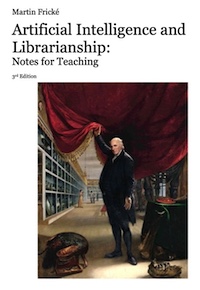
|
FreeComputerBooks.com
Links to Free Computer, Mathematics, Technical Books all over the World
|
|
- Title: Artificial Intelligence and Librarianship
- Author(s) Martin Frické
- Publisher: SoftOption, Ltd. (2024); eBook (Creative Commons Licensed)
- License(s): Creative Commons License (CC)
- Hardcover: N/A
- eBook: PDF
- Language: English
- ISBN-10: N/A
- ISBN-13: 978-0-473-72294-4
- Share This:

|
Generative AI is an important new area for librarianship, this book opens with an introduction to AI, principally in relation to large language models, including an analysis of research and systems by others in the area. This context is then related to librarianship, particularly to roles that librarians might assume in the near future.
About the Authors- N/A
- Artificial Intelligence (AI)
- Geographic Information Systems (GIS)
- Machine Learning
- Neural Networks and Deep Learning
 Similar Books:
Similar Books:
-
 Unlocking Artificial Intelligence: From Theory to Applications
Unlocking Artificial Intelligence: From Theory to Applications
A state-of-the-art overview of current machine learning research and its exploitation in various application areas. Deep integration of artificial intelligence (AI) methods in products and services is essential for companies to stay competitive.
-
 Artificial Intelligence - Intelligent Art?
Artificial Intelligence - Intelligent Art?
As algorithmic data processing increasingly pervades everyday life, it is also making its way into the worlds of art, literature and music. In doing so, it shifts notions of creativity and evokes non-anthropocentric perspectives on artistic practice.
-
 Generative AI in Higher Education: The ChatGPT Effect
Generative AI in Higher Education: The ChatGPT Effect
Provide a comprehensive examination of the use and impact of ChatGPT and Generative AI (GenAI) in higher education. Introduce the Six Assessment Redesign Pivotal Strategies (SARPS) and an AI Assessment Integration Framework.
-
 Art Intelligence: How Generative AI Relates to Human Art-Making
Art Intelligence: How Generative AI Relates to Human Art-Making
What impact will Generative AI (GenAI) have on how we create art and how we understand what art is for? How will it affect the role of the artist in the future and the conditions under which artists will work?
-
 Introduction to AI Safety, Ethics, and Society (Dan Hendrycks)
Introduction to AI Safety, Ethics, and Society (Dan Hendrycks)
Explores a range of ways could fail to harness AI safely, such as malicious use, accidental failures, erosion of safety standards due to competition between AI developers or nation-states, and potential loss of control over autonomous systems.
-
 Artificial Intelligence: Foundations of Computational Agents
Artificial Intelligence: Foundations of Computational Agents
The book's novel agent design space provides a coherent framework for learning, reasoning and decision making. Numerous realistic applications and examples facilitate readers understanding.
-
 Agents in the Long Game of AI: Computational Cognitive Modeling
Agents in the Long Game of AI: Computational Cognitive Modeling
The vast majority of current AI relies wholly on machine learning (ML). One hope for overcoming this limitation is hybrid AI: that is, AI that combines ML with knowledge-based processing.
-
 Artificial Intelligence and Systems of the Earth (Michel Speiser)
Artificial Intelligence and Systems of the Earth (Michel Speiser)
About the potential and capabilities of artificial intelligence (AI) and machine learning (ML) for studying the Earth. It aims to serve as an eye-opener on new avenues of scientific research that can be enabled by AI/ML.
-
 AI and Machine Learning in Health Care and Medical Sciences
AI and Machine Learning in Health Care and Medical Sciences
This open access book provides a detailed review of the latest methods and applications of artificial intelligence (AI) and machine learning (ML) in medicine - a comprehensive guide to how AI and ML techniques can best be applied in health care.
-
 AI Demystified (Alex David Pratt)
AI Demystified (Alex David Pratt)
The book is a groundbreaking exploration of how the landscape of program evaluation will be redefined by artificial intelligence and other emerging digital technologies.
-
 Artificial Intelligence and Evaluation: Emerging Technologies
Artificial Intelligence and Evaluation: Emerging Technologies
The book explores the potential of artificial intelligence to transform everyday life while highlighting both the benefits and risks. The book encourages readers to embrace AI responsibly, focusing on its impact on healthcare, creativity, and society.





